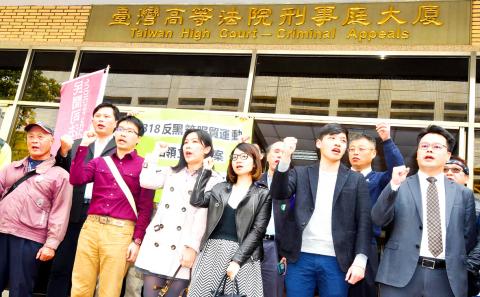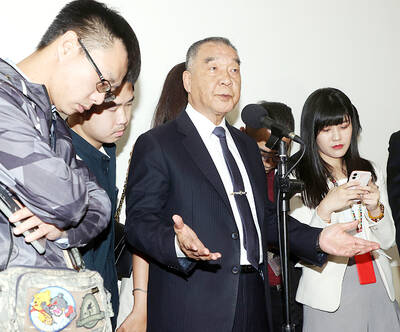The Taiwan High Court yesterday upheld the “not guilty” verdict for the 22 defendants who occupied the Legislative Yuan during a protest in 2014, saying they were exercising their right to political dissent and freedom of speech.
The 22 were first acquitted in March last year and public prosecutors are unlikely to appeal yesterday’s decision in accordance with the Criminal Speedy Trial Act (刑事妥速審判法) of 2010.
The defendants and other protesters stormed the legislature on March 18, 2014, and occupied the legislative chamber for almost 23 days in what became known as the Sunflower movement.

Photo: Liu Hsin-de, Taipei Times
The defendants included members of different activist groups, such as Lin Fei-fan (林飛帆), Chen Wei-ting (陳為廷), Huang Kuo-chang (黃國昌), Tsay Ting-kuei (蔡丁貴) and Wei Yang (魏揚). While the Taipei District Court acquitted the group on charges of “civil disobedience,” the High Court based its decision on the protection of freedom of speech and right to dissenting views.
Reading the court’s ruling, High Court spokesman Chiu Chung-yi (邱忠義) said that the defendants acted in response to Chinese Nationalist Party (KMT) Legislator Chang Ching-chung (張慶忠) and other KMT lawmakers’ rush to pass the cross-strait service trade agreement draft bill through a legislative subcommittee without following proper procedures.
The defendants’ action “did not cause any clear and immediate danger,” Chou said, adding that according to Council of Grand Justices’ Interpretation No. 455, the defendants should be given protection under freedom of speech, for which they should not be oppressed or punished in the aftermath of their undertaken acts.
The High Court determined that the group was “urging other protesters to enter the legislature together as a group to express their discontent and opposition to the cross-strait agreement.”
“They were not maligning and vilifying indiscriminately, nor did they incite the crowd to commit acts of violence against the government,” the ruling said.
“At that time, the draft bill was headed for a vote in the legislature within three days. The defendants decided that occupying the legislature was their only recourse, as they perceived there was insufficient time and no other effective way to block the draft bill,” it said.
“That people can express contrary opinions on public affairs issues demonstrates the freedom of expression that Taiwan’s society has fought to earn through very difficult circumstances,” it said.
“The acquittal proves that the cross-strait agreement had done grave harm to our constitutional democracy. We are not guilty, but the real guilty ones are [then-president] Ma Ying-jeou (馬英九) and his government, and KMT Legislator Chang Ching-chung, who tried to ram the draft bill through by using illegal and unconstitutional means,” said Huang, now New Power Party executive chairman.
Chen said the ruling serves as a message to Chinese President Xi Jinping (習近平) “that you could be an emperor and extend your rule indefinitely, but Taiwan is a democratic nation.”
“Xi should not infringe on Taiwan’s territory, because Taiwanese will rise and fight, and our democracy and the judiciary will protect the public’s rights,” Chen said.

ROLLER-COASTER RIDE: More than five earthquakes ranging from magnitude 4.4 to 5.5 on the Richter scale shook eastern Taiwan in rapid succession yesterday afternoon Back-to-back weather fronts are forecast to hit Taiwan this week, resulting in rain across the nation in the coming days, the Central Weather Administration said yesterday, as it also warned residents in mountainous regions to be wary of landslides and rockfalls. As the first front approached, sporadic rainfall began in central and northern parts of Taiwan yesterday, the agency said, adding that rain is forecast to intensify in those regions today, while brief showers would also affect other parts of the nation. A second weather system is forecast to arrive on Thursday, bringing additional rain to the whole nation until Sunday, it

LANDSLIDES POSSIBLE: The agency advised the public to avoid visiting mountainous regions due to more expected aftershocks and rainfall from a series of weather fronts A series of earthquakes over the past few days were likely aftershocks of the April 3 earthquake in Hualien County, with further aftershocks to be expected for up to a year, the Central Weather Administration (CWA) said yesterday. Based on the nation’s experience after the quake on Sept. 21, 1999, more aftershocks are possible over the next six months to a year, the agency said. A total of 103 earthquakes of magnitude 4 on the local magnitude scale or higher hit Hualien County from 5:08pm on Monday to 10:27am yesterday, with 27 of them exceeding magnitude 5. They included two, of magnitude

A total of 41 US military personnel were stationed in Taiwan as of December last year, a US congressional report said on Friday last week ahead of Tuesday’s passage of an aid package that included US$8 billion for Taiwan. The Congressional Research Service in a report titled Taiwan Defense Issues for Congress said that according to the US Department of Defense’s Defense Manpower Data Center, 41 US military personnel were assigned for duty in Taiwan. Although the normalization of relations with the People’s Republic of China (PRC) in 1979 included a vow to withdraw a military presence from Taiwan, “observers have indicated

The navy next month is expected to commission into service two more domestically built Tuo Chiang-class stealth missile corvettes, a source said yesterday. The Hsu Chiang (旭江, PGG-621) and the Wu Chiang (武江, PGG-623) would be officially commissioned in a ceremony early next month, the source said, speaking on condition of anonymity. The corvettes, launched in February and June last year respectively, were delivered to the navy in February. They are the third and fourth Tuo Chiang-class stealth missile corvettes to be produced. The Tuo Chiang-class corvette is a domestically designed and manufactured class of fast and stealthy multipurpose corvette built for the